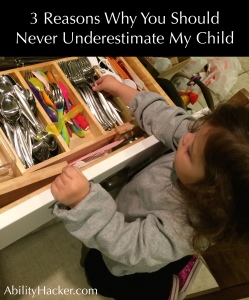My daughter recently aged out of our state’s early intervention program. As a result, she now attends preschool at our local elementary school, getting physical and occupational therapy as part of her school day. The initial process of qualifying for therapy and establishing her IEP was overwhelming and confusing. However, once we got past that hump things progressed relatively smoothly.
Until now.
Overall, there is a lot that is going well. Lily transitioned beautifully to the new school. She seems happy and is making friends. The teachers are nice. The curriculum is great. Communication with the lead teacher and the nurse has been better than I expected.
So what am I worried about?
When I picked her up the other day, the after care teacher told me she let the kids have a treat because they helped clean the classroom. She had given them paper towels and they wiped down the table tops, legs, and chairs. At first I thought, “That’s great! They are teaching kids responsibility to help with chores.”
But then… she shared that she didn’t ask Lily to help clean because all that bending and getting down on the floor would have been too hard for her.
I was shocked. How could she think that?!? Lily uses her walker to run and jump and crouch, she can crawl like the wind, and she doesn’t have any trouble getting from kneeling to standing and back. What about wiping down a table is too hard for her?
After taking a deep breath, I took the opportunity to kindly and patiently assure her that those activities are well within the scope of Lily’s ability. I also asked her to please include her in chore-like tasks in the future.
Our vision for Lily includes her being expected to do everything other kids are expected to do. The way she accomplishes the task may look a little different due to adaptations for her ability… but the expectation is paramount.
Why is this so important to me?
- Confidence building: Children build confidence when they successfully accomplish something through hard work. When someone looks at a child with braces and a walker and assumes they are incompetent because of their disability, they are robbing that child of the opportunity to build confidence.
- Self-dependence: The primary role of teachers and parents is to teach children the skills they need to be independent. Sometimes adults think they are doing a child with a disability a favor by doing things for them that they can actually do for themselves. In their mind, they are being kind. However, the hidden message to the child is that he or she needs the adult’s help and cannot accomplish these tasks on their own. A better approach is to teach children how to adapt activities so they can accomplish them independently.
- Example: Lily can use the basket on her walker to take trash from the table to the trashcan. If other kids are expected to dispose of their own trash, she should be expected to as well.
- Avoid encouraging a sense of entitlement: When a child has a disability, there is a very fine line between providing the special treatment the child requires due to their disability, and teaching the child that they are inherently deserving of privilege because they are disabled. My goal is always to avoid the latter by having Lily do as much as possible for herself. Truthfully, it is often easier to do things for her, and sometimes I catch myself taking that easier route. However, when I give her the chance, she constantly surprises me with what she CAN do.
Now I’m off to figure out how to get Lily’s teachers to stop underestimating her. I’m open to ideas – let me know what’s worked for you!

have you listened to this podcast yet? “How to become Batman” invisibilia. It’s pretty awesome and right in line with what you’re saying: http://www.npr.org/podcasts/510307/invisibilia — specifically the second story which is, “the story of a man who is blind and says expectations have helped him see. Yes. See.”
maybe send Lily’s teacher’s the link
I haven’t heard it, but I am downloading it now so that I can listen to it on my way into work in the morning. Thank you!